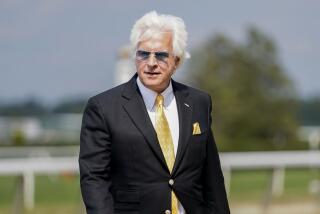Cyclist Hamilton Loses Doping Appeal
- Share via
TURIN, Italy — Olympic gold medal-winning cyclist Tyler Hamilton lost his appeal Saturday, an international sports tribunal ruling that he had someone else’s blood inside his system when he flunked a doping test at the 2004 Tour of Spain.
In a unanimous decision, a three-member panel of the Swiss-based Court of Arbitration for Sport ruled that Hamilton, 34, of Boulder, Colo., had received a transfusion, prompting the positive test Sept. 11, 2004. The case marks the first time a U.S. athlete has been disciplined for such an offense.
Considered a potential successor to retired seven-time Tour de France winner Lance Armstrong, Hamilton was suspended for two years; the suspension runs through Sept. 22, 2006.
Hamilton said in a telephone interview Saturday that he was considering his cycling future and felt “incredibly hurt,” adding, “Now, really, there’s no fight to clear my name. From now on, I’m a guilty athlete, as they say.”
Hamilton, who earned a reputation for toughness after a third-place finish in the 2003 Tour de France, riding most of the three-week event with a broken collarbone, also said, “I know what the truth is -- I’m innocent.”
In the five-plus years that have passed since the U.S. Anti-Doping Agency assumed oversight of doping control protocols in the United States, Hamilton, with his lawyer, Howard Jacobs of Los Angeles, waged perhaps the most aggressive fight fought on behalf of an athlete accused of a doping violation.
The case involved repeated hearings; stacks of documents and e-mails; fact-finding missions to Europe for inspections of laboratories in Switzerland and Greece.
The International Olympic Committee, which oversees doping controls at the Olympics, avoided a major challenge by virtue of the ruling against Hamilton. The same lab in Switzerland that handled Hamilton’s Tour of Spain test is handling certain blood-related doping tests from the Turin Games.
Hamilton added that if, in the future, another athlete accused of a doping offense were to call and ask him for advice, he’d say the system seems stacked in USADA’s favor: “I’d say, ‘Save your money. Don’t fight it -- you’re going up against a brick wall.’ What more could I have done?”
USADA matched Hamilton’s aggressive legal posture, maintaining all along that he could not satisfactorily explain what was, in an extremely complicated case, the fundamental question: Why were there markers for someone else’s blood in his body?
Meanwhile, the Russian Olympic Committee and Viatcheslav Ekimov, the 2000 gold medalist in the time trial and runner-up in 2004, have challenged Hamilton’s claim to the gold. CAS said a decision in that case is due “in the near future.”
More to Read
Go beyond the scoreboard
Get the latest on L.A.'s teams in the daily Sports Report newsletter.
You may occasionally receive promotional content from the Los Angeles Times.






